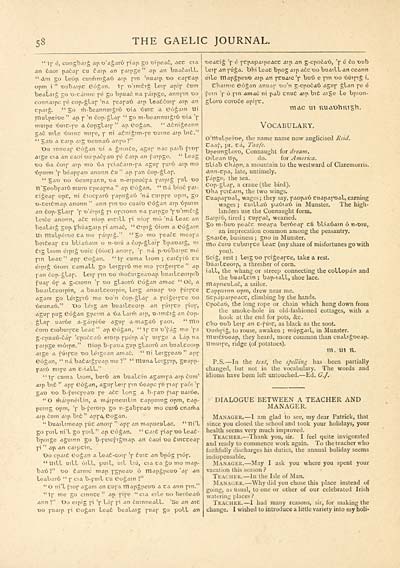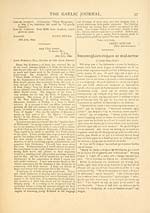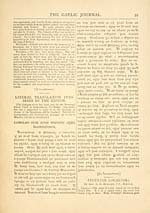Download files
Complete book:
Individual page:
Thumbnail gallery: Grid view | List view

5S
THE GAELIC JOURNAL.
" !)• 6, consbuig a]\'o'ŵ5^ni yi^\\ 50 ■oi|\eAc, acc ci>.\
An CAOt IXAC^l- ÜU tAi\\ All VAiixge" A\\ All bu-icAilL.
" •dm 50 teói\ cuiitiniJAt) Ai^i j-iii 'iiUAip ■do ca|-cai\
oiMTi Í " ■oiibAipc eóJAti. 1r o'lnicig te\]' a^mY ctiiii
beAlAig 50 ■0-CÁ1111C ye 50 bpUAc iiA i.-Áii\5e, Aiini'iii X)o
COlltlAlilC J'Ó COp-jlAl" 'llA ]-eA]-A-D AX'fy leACCOl)- &i\\ All
cpoiig. " 50 lii-beAninitgi-D oiA ■ouiu a eógAtn Hi
nuilpei'oe " A\\ y '11 cop-glA]- " 50 ni-beAiimii5it) tiiA ")•
niuii\e ■omc-i-e A copjlAij" " Ai\ eoJAii. " .AEnijeAiiii
5*6 tiile •Ù11111C niii-e, y m Acnigim-i-e TJiiiiie Aip bic."
" 5AT) A CAip A15 OeUllA'D AllJ-O !"
■Oo itineA)- eóJAii ■OÍ A jiioice, AgU)- riAC i\Aib ŷ\oy
Aige CIA All CAOÍ ■oopAcpAT) ye cAii\ An ýAti\5e. " LeAg
•00 ẂA coif Aip 1110 t>A 1-CÍACA111-1-A A'^íìy yulX) A\y. 1110
■ÔlMlim 'y béûpj-'AT) Atioiin CU " Ap J-All COp-glA)-.
" 5A-0 -DO ■ôemipAr.ti, ua ii-eipeocpA I'AiiMg yaX, 00
1l'5eob):AiT) nnifo cpeApiA " Ajv eógAii. " 11Á bioc jtai-
Ci JGAl' ope, til ClOCpAlÙ l'ApHJA-Ô 'tlá CUipfC Opill, gO
■o-ceictriAp Ationn " Aim ym vo cuaid eogAii Aip ŵpuiiii
All cop-5tAif Y ■o'éipig y\ oi-cioiiti TiA fAinge Y'^'^'icig
Leice Atioiiii, acc iii'op eicilb p iiio)' 1110 '11Á teAc ah
beAlAij; jiip -plHiASAipp All! AC, " eijMJ òioiii A eo^Air.
Ill niulpéi-oe CA me 1-Á11M5." "Jo mo I'eAcc meA)\\
beiceAf CU bLÌA-ÔAiti o ivoiú a cop-gbAip bpADAij, 111
C15 liom énMg 'ouic (-oioc) Aiioi)", ']• nÁ p-'oúbAipc me
pn LeAc" Ap)" eoJAii. "iy cumA biom ; CAicp'ẃ cii
éipig ■ôiom cAmALl 50 lei^pẃ me 1110 pcigeifce " Ap
]-Aii cop-jbAf. tei)' pn x>o liiociiigei'OAp biiAilceoipib
fUA)' Ó]" A 5-CIOIIII ']• t)0 gbAOlt) eÓJAll AmAC " Oc, A
buAilueoipin, A buAilceoii\iii, leig ahuaj* t)o fúi]-ce
AjAm 50 l.éi5V''° "■'s '°°'" c^op-glA)' A pci'jeifce x>o
■òeunAẂ." uo léij Ati buAilceoip ah piii'ce pay,
Aju)' )ui5 eógAH speiiii a ■ÔAtiim Aip, ■o-inicij An cop-
glAp uAiTie A-gÁipiŵe Agup A-niAjA-ò yAOi. "trio
ciii-o ciobun-ce LeAC " Ap eóJAn, " \y cii v'yÀ^ me Y*
g-cpuAW-cAp 'cpoccAẂ eiDip ppéip a'p tiipge a Lap nA
pAipje móipe." Iliop b-pAXJA jup glAoiw An buAlceoip
Aije A fúipce oo léigeAn AmAc. " Hi LeigpeAX) " A\\y
eóJAn, " nÁ bacAiJireApme ?" "TIlunAbeigpp, geApp-
y&m mipe An c-ìaII."
"1p cum A liom, beiù An buAbci'n AgAmpA Aip èum'
Aip bic " App eóJAn, Agupteippin ueApcpepiAp pAói Y
5A-0 'OO b-peicpeAu ye acc long a b-pA-o piAp UAiwe.
" O ihÁipnéiÚn, A mÁipneuibin CAppumg opm, CAp-
pumg opm, 'p b-peiTjip 50 n-gAbpeAU mo cuiẃ cnAtîiA
Aip cum Aip bic " AppA GogAn.
" buAiLimeAp púc Anoip " App An mApueutAC. " tli'L
50 poll ni'l 50 poll" Ap eógAn. " CAic piApwo leAc-
bpoige Agumn go b-peicpgniAp An cAoi 130 cutcceAp
p' " Ap An cAipcin.
t)o cpAic CogAn A leAC-coip Y êuic An bpóg p6y.
"Hill uill óill, puil, uil Ini, CIA CA go mo mAp-
bA-D?" TJo cAinic mAp pgpeA-o ó niApgpeu-o 'ay An
leAbAit) " p CIA b-puil CU eogAin ?"
" O ni'l pop AgAm An cupA tTI Apgpeuti A ca Ann pn."
"1p me go cinnce " Ap pipe "cia eile 00 beiẃoAt)
Ann ';" X)o eipi'g pi Y ^^r P ■*" cuinneAll. 'Se An aic
DO pUAlp pi eogAn LcAC bsAlAlg pUAp gO poll All
■oeACig 'p é prpApAipeACc Aip An g-cpocAW, Y c co nub
leip An púgA. blií leAC bpog Aip Acc üo buAill An ceAnn
eile 111 Apgpeno Aip An pcuAic Y b"* e pm t>o ■óúipg i.
CliAinic eogAn AnuAp no'n g-cpocAẂ Agup glAn ye é
pein 'p Ü pin AtnAÚ ni pAb cnuc Aip bic Aige Le bpion-
gloio coixjce Apipc.
mẃc ui nvii\t)hnig)i.
Vocabulary.
O'niulpeioe, the name name now anglicised Jiciii.
CA^\p, pr. CÁ, Taafe.
b]\eungLoit), Connaught for dream,
OileAii Up, do. for America.
SlÌAb CliÁpn, a mountain to the westward of Claremorris.
<Min-cpA, late, untimely.
V'ipge, the sea.
Cop-glAp, a crane (the bird).
■QhA pcicAiii, the two wings.
CuApApoAl, wages; they say, pAopAÔ cuApAi"OAl, earning
wages ; cuiIIaw pAWiAW in Munster. The high-
landers use the Connaught form,
SAipit), tired ; cuppAc, wearied.
50 m-but) peAcc meApA beincAp cú bliAWAin ó n-'oili,
an imprecation common among the peasantry,
gnAice, business ; gno in Munster.
1110 cuTO cubuipce leAc (my share of misfortunes go with
you).
Scig, rest ; leigno pci'geApce, take a rest.
bÚAilceoip, a thresher of corn.
íaIL, the whang or streep connecting the collopÁn and
the buAiLcin ; bAp-iAll, shoe lace.
lllApiieulAÒ, a sailor.
CA)\]Uiinn opm, drew near me.
ScpjpAipoAcc, climbing by the hands.
CpocAẂ, the long rope or chain which hung down from
the smoke-hole in old-fashioned cottages, with a
hook at the end for pots, &c.
Cho ■oub leip An c-púic, as black as the soot.
■Ouriip'g, to rouse, awaken ; múpgAil, in Munster.
llluiciueAp, they heard, more common than cUAligneAp.
tlmuipe, ridge (of potatoes).
111. til n.
P.S. — In the text, the spelling has been partially
changed, but not in the vocabulary. The words and
idioms have been left untouched. — Ed. G.[.
DIALOGUE BETWEEN A TEACHER AND
MANAGER.
Manager. — I am glad to see, my dear Patrick, that
since you closed the school and took your holidays, your
health seems very much improved.
Teacher. — Thank you, sir. I feel quite invigorated
and ready to commence work again. To the teacher who
faithfully discharges his duties, the annual holiday seems
indispensable.
Manager. — May I ask you where you spent your
vacation this season ?
Teacher. — In the Isle of Man.
Manager. — Why did you chose this place instead of
going, as usual, to one or other of our celebrated Irish
watering places ?
Teacher. — I had many reasons, sir, for making the
change. I wished to introduce a little variety into my holi-
THE GAELIC JOURNAL.
" !)• 6, consbuig a]\'o'ŵ5^ni yi^\\ 50 ■oi|\eAc, acc ci>.\
An CAOt IXAC^l- ÜU tAi\\ All VAiixge" A\\ All bu-icAilL.
" •dm 50 teói\ cuiitiniJAt) Ai^i j-iii 'iiUAip ■do ca|-cai\
oiMTi Í " ■oiibAipc eóJAti. 1r o'lnicig te\]' a^mY ctiiii
beAlAig 50 ■0-CÁ1111C ye 50 bpUAc iiA i.-Áii\5e, Aiini'iii X)o
COlltlAlilC J'Ó COp-jlAl" 'llA ]-eA]-A-D AX'fy leACCOl)- &i\\ All
cpoiig. " 50 lii-beAninitgi-D oiA ■ouiu a eógAtn Hi
nuilpei'oe " A\\ y '11 cop-glA]- " 50 ni-beAiimii5it) tiiA ")•
niuii\e ■omc-i-e A copjlAij" " Ai\ eoJAii. " .AEnijeAiiii
5*6 tiile •Ù11111C niii-e, y m Acnigim-i-e TJiiiiie Aip bic."
" 5AT) A CAip A15 OeUllA'D AllJ-O !"
■Oo itineA)- eóJAii ■OÍ A jiioice, AgU)- riAC i\Aib ŷ\oy
Aige CIA All CAOÍ ■oopAcpAT) ye cAii\ An ýAti\5e. " LeAg
•00 ẂA coif Aip 1110 t>A 1-CÍACA111-1-A A'^íìy yulX) A\y. 1110
■ÔlMlim 'y béûpj-'AT) Atioiin CU " Ap J-All COp-glA)-.
" 5A-0 -DO ■ôemipAr.ti, ua ii-eipeocpA I'AiiMg yaX, 00
1l'5eob):AiT) nnifo cpeApiA " Ajv eógAii. " 11Á bioc jtai-
Ci JGAl' ope, til ClOCpAlÙ l'ApHJA-Ô 'tlá CUipfC Opill, gO
■o-ceictriAp Ationn " Aim ym vo cuaid eogAii Aip ŵpuiiii
All cop-5tAif Y ■o'éipig y\ oi-cioiiti TiA fAinge Y'^'^'icig
Leice Atioiiii, acc iii'op eicilb p iiio)' 1110 '11Á teAc ah
beAlAij; jiip -plHiASAipp All! AC, " eijMJ òioiii A eo^Air.
Ill niulpéi-oe CA me 1-Á11M5." "Jo mo I'eAcc meA)\\
beiceAf CU bLÌA-ÔAiti o ivoiú a cop-gbAip bpADAij, 111
C15 liom énMg 'ouic (-oioc) Aiioi)", ']• nÁ p-'oúbAipc me
pn LeAc" Ap)" eoJAii. "iy cumA biom ; CAicp'ẃ cii
éipig ■ôiom cAmALl 50 lei^pẃ me 1110 pcigeifce " Ap
]-Aii cop-jbAf. tei)' pn x>o liiociiigei'OAp biiAilceoipib
fUA)' Ó]" A 5-CIOIIII ']• t)0 gbAOlt) eÓJAll AmAC " Oc, A
buAilueoipin, A buAilceoii\iii, leig ahuaj* t)o fúi]-ce
AjAm 50 l.éi5V''° "■'s '°°'" c^op-glA)' A pci'jeifce x>o
■òeunAẂ." uo léij Ati buAilceoip ah piii'ce pay,
Aju)' )ui5 eógAH speiiii a ■ÔAtiim Aip, ■o-inicij An cop-
glAp uAiTie A-gÁipiŵe Agup A-niAjA-ò yAOi. "trio
ciii-o ciobun-ce LeAC " Ap eóJAn, " \y cii v'yÀ^ me Y*
g-cpuAW-cAp 'cpoccAẂ eiDip ppéip a'p tiipge a Lap nA
pAipje móipe." Iliop b-pAXJA jup glAoiw An buAlceoip
Aije A fúipce oo léigeAn AmAc. " Hi LeigpeAX) " A\\y
eóJAn, " nÁ bacAiJireApme ?" "TIlunAbeigpp, geApp-
y&m mipe An c-ìaII."
"1p cum A liom, beiù An buAbci'n AgAmpA Aip èum'
Aip bic " App eóJAn, Agupteippin ueApcpepiAp pAói Y
5A-0 'OO b-peicpeAu ye acc long a b-pA-o piAp UAiwe.
" O ihÁipnéiÚn, A mÁipneuibin CAppumg opm, CAp-
pumg opm, 'p b-peiTjip 50 n-gAbpeAU mo cuiẃ cnAtîiA
Aip cum Aip bic " AppA GogAn.
" buAiLimeAp púc Anoip " App An mApueutAC. " tli'L
50 poll ni'l 50 poll" Ap eógAn. " CAic piApwo leAc-
bpoige Agumn go b-peicpgniAp An cAoi 130 cutcceAp
p' " Ap An cAipcin.
t)o cpAic CogAn A leAC-coip Y êuic An bpóg p6y.
"Hill uill óill, puil, uil Ini, CIA CA go mo mAp-
bA-D?" TJo cAinic mAp pgpeA-o ó niApgpeu-o 'ay An
leAbAit) " p CIA b-puil CU eogAin ?"
" O ni'l pop AgAm An cupA tTI Apgpeuti A ca Ann pn."
"1p me go cinnce " Ap pipe "cia eile 00 beiẃoAt)
Ann ';" X)o eipi'g pi Y ^^r P ■*" cuinneAll. 'Se An aic
DO pUAlp pi eogAn LcAC bsAlAlg pUAp gO poll All
■oeACig 'p é prpApAipeACc Aip An g-cpocAW, Y c co nub
leip An púgA. blií leAC bpog Aip Acc üo buAill An ceAnn
eile 111 Apgpeno Aip An pcuAic Y b"* e pm t>o ■óúipg i.
CliAinic eogAn AnuAp no'n g-cpocAẂ Agup glAn ye é
pein 'p Ü pin AtnAÚ ni pAb cnuc Aip bic Aige Le bpion-
gloio coixjce Apipc.
mẃc ui nvii\t)hnig)i.
Vocabulary.
O'niulpeioe, the name name now anglicised Jiciii.
CA^\p, pr. CÁ, Taafe.
b]\eungLoit), Connaught for dream,
OileAii Up, do. for America.
SlÌAb CliÁpn, a mountain to the westward of Claremorris.
<Min-cpA, late, untimely.
V'ipge, the sea.
Cop-glAp, a crane (the bird).
■QhA pcicAiii, the two wings.
CuApApoAl, wages; they say, pAopAÔ cuApAi"OAl, earning
wages ; cuiIIaw pAWiAW in Munster. The high-
landers use the Connaught form,
SAipit), tired ; cuppAc, wearied.
50 m-but) peAcc meApA beincAp cú bliAWAin ó n-'oili,
an imprecation common among the peasantry,
gnAice, business ; gno in Munster.
1110 cuTO cubuipce leAc (my share of misfortunes go with
you).
Scig, rest ; leigno pci'geApce, take a rest.
bÚAilceoip, a thresher of corn.
íaIL, the whang or streep connecting the collopÁn and
the buAiLcin ; bAp-iAll, shoe lace.
lllApiieulAÒ, a sailor.
CA)\]Uiinn opm, drew near me.
ScpjpAipoAcc, climbing by the hands.
CpocAẂ, the long rope or chain which hung down from
the smoke-hole in old-fashioned cottages, with a
hook at the end for pots, &c.
Cho ■oub leip An c-púic, as black as the soot.
■Ouriip'g, to rouse, awaken ; múpgAil, in Munster.
llluiciueAp, they heard, more common than cUAligneAp.
tlmuipe, ridge (of potatoes).
111. til n.
P.S. — In the text, the spelling has been partially
changed, but not in the vocabulary. The words and
idioms have been left untouched. — Ed. G.[.
DIALOGUE BETWEEN A TEACHER AND
MANAGER.
Manager. — I am glad to see, my dear Patrick, that
since you closed the school and took your holidays, your
health seems very much improved.
Teacher. — Thank you, sir. I feel quite invigorated
and ready to commence work again. To the teacher who
faithfully discharges his duties, the annual holiday seems
indispensable.
Manager. — May I ask you where you spent your
vacation this season ?
Teacher. — In the Isle of Man.
Manager. — Why did you chose this place instead of
going, as usual, to one or other of our celebrated Irish
watering places ?
Teacher. — I had many reasons, sir, for making the
change. I wished to introduce a little variety into my holi-
Set display mode to: Large image | Transcription
Images and transcriptions on this page, including medium image downloads, may be used under the Creative Commons Attribution 4.0 International Licence unless otherwise stated. ![]()
| Early Gaelic Book Collections > Blair Collection > Gaelic journal > Volume 4, number 33 > (58) |
|---|
| Permanent URL | https://digital.nls.uk/79325195 |
|---|
| Description | No. 33, Vol. IV. 1889. |
|---|---|
| Shelfmark | Blair.217 |
| Attribution and copyright: |
|
| Description | A selection of books from a collection of more than 500 titles, mostly on religious and literary topics. Also includes some material dealing with other Celtic languages and societies. Collection created towards the end of the 19th century by Lady Evelyn Stewart Murray. |
|---|
| Description | Selected items from five 'Special and Named Printed Collections'. Includes books in Gaelic and other Celtic languages, works about the Gaels, their languages, literature, culture and history. |
|---|

